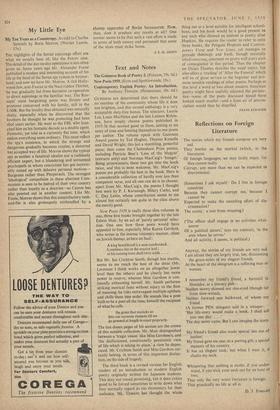My Little Eye
THE highlights of the Soviet espionage effort are what we usually hear of, like the Petrov case. The detail of the day-to-day operations is less often given us. Some years ago Mr. Alexander Foote published a modest and interesting account of his life at the head of the Soviet spy system in Switzer- land; and now we have Mr. Morros. A rich Holly- wood Jew, anti-Fascist in the Nazi-ridden Thirties, he was gradually led from harmless co-operation to direct espionage in the familiar way. The Rus- sians' main bargaining point was threats and promises concerned with his family, still in the USSR. But the loyalty thus obtained was naturally shaky, especially when he discovered that the brothers he thought he was protecting had been shot years earlier. He went to the FBI, who laun- ched him on his fantastic decade as a double agent. Fantastic, yet told in a curiously flat tone, which makes everything seem ordinary. This must reflect the spy's existence, in which the strange and dangerous gradually becomes routine, a distorted but accepted way of life. Morros shows the typical spy as neither a fanatical idealist nor a ruthlessly efficient expert, but a blundering and tormented psychopath in whom conviction has got inextric- ably mixed up with delusive personal motives— Burgesses rather than Pimpernels. The strongest 'ideological' compulsion in these aberrant Com- munists is seen to be hatred of their own country rather than loyalty to a doctrine—as Camus has also pointed out in another context. Like Mr. Foote, Morros shows that this unsatisfactory rank- and-file is also grotesquely mishandled by a
clumsy apparatus of Soviet bureaucrats. How, then, does it produce any results at all? One answer seems to be that such a vast effort is made in terms of both money and personnel that some of the shots must strike home.
J. E. M. ARDEN






































 Previous page
Previous page